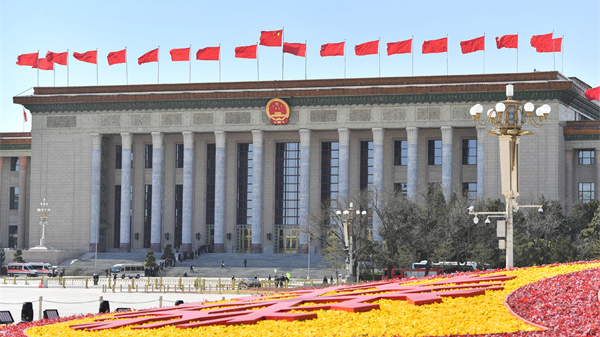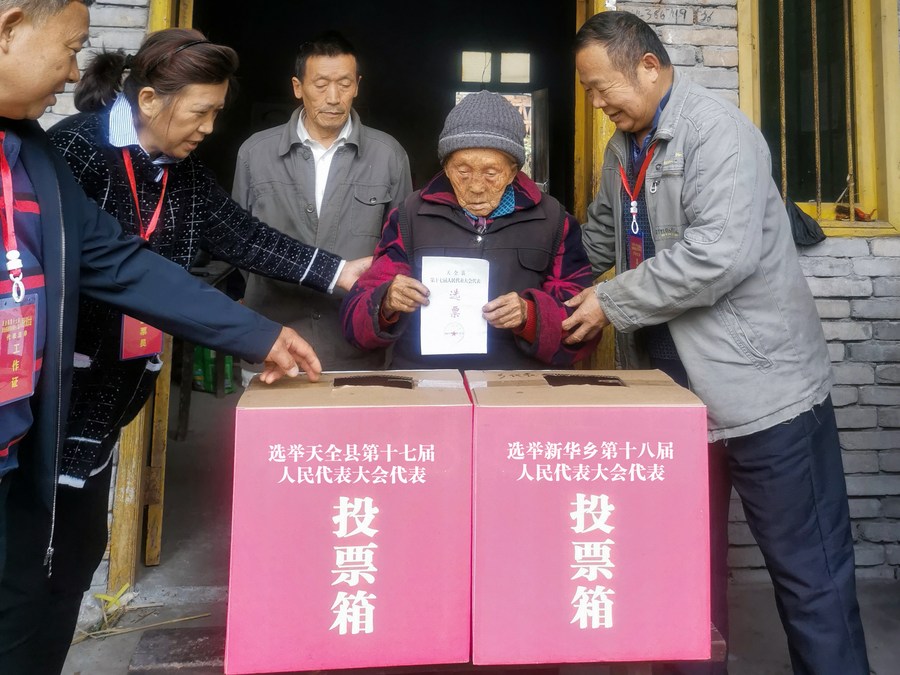
The Great Hall of the People in Beijing, capital of China, March 4, 2022. /Xinhua
The Great Hall of the People in Beijing, capital of China, March 4, 2022. /Xinhua
Editor's note: Josef Gregory Mahoney is professor of politics and international relations at East China Normal University and senior research fellow in the Institute for the Development of Socialism with Chinese Characteristics at Southeast University. The article reflects the author's opinions and not necessarily those of CGTN.
The normative, culturally hegemonic concept of democracy promoted by liberal democracies has too often stifled political innovations that aim nevertheless to achieve intrinsic democratic results through alternative instrumental means.
That said, we live in a new era, one in which citizens in Western countries are waking up to the profound and still worsening fault lines proliferating within their own political and governmental systems. What is not yet apparent to many around the world and indeed will be challenging for many to recognize is the extent to which political and economic developments in China have evolved and achieved greater degrees of democracy, and done so in a time when most so-called China watchers have declared the exact opposite has been happening.
When we examine the word "democracy" linguistically there are two things to note. First, diachronically speaking, it's derived from an Ancient Greek, where "demos" means "people" and "kratos" means "power," where power can be described as the power to govern oneself. On the one hand, many in the West point fondly to the example of ancient Athens and celebrate what they view as the deep and positive cultural roots of their democratic systems.
On the other hand, the intellectual heroes of Athens – Socrates, Plato, and Aristotle – all condemned the instrumental form of democracy then practiced as one of the worst forms of government, one that was susceptible to irrational emotionalism, charismatic leaders capable of manipulating public opinion, and cultural and economic elites who could sway elections in ways that benefited themselves at the expense of the polis.
Secondly, synchronically speaking, democracy in theory and practice has been closely associated with modern liberal democracies, most especially the United States and United Kingdom, that normatively prescribed in rather narrow conceptual terms how democracy can be defined, even though these countries built their power and prestige through unconscionable and irreconcilable histories of imperialism, genocide and dispossession – legacies that remain present in the U.S., for example, with substantial minority populations with high rates of poverty – including Native Americans with poverty rates exceeding 25 percent – but also present in foreign policies insomuch as the U.S. still operates globally as a unilateral hegemon, imposing its will on others. Such is the theory and practice of American if not Western democracy.
In Chinese, the word for democracy is "minzhu." This translates literally as "people govern (themselves)." In the American sense of "people govern themselves," this is equated with a type of universal suffrage and a combination of direct and representative democracy, regardless of the fact that the system fails to produce true representation or effective governance in practice.
When we examine American governance today we find a system in deep disarray in terms of performance and popular opinion. We see a system incapable of dealing effectively with emerging crises such as climate change and COVID-19, and also incapable of solving entrenched and still worsening problems including guns, violent crime, and equitable access to even basic healthcare, among other concerns. We see a deepening political polarization and unchecked culture wars, a proliferation of fake news and neo-populist political opportunists, and in the background, according to well-researched empirical studies, an oligarchy disproportionately wielding power, to such an extent that some have concluded the U.S. is no longer a democracy. Simultaneously, we see growing political movements trying to impose their values on others, even promoting various forms of totalitarianism as being preferable to living in the current chaos.
In China today, the concept of democracy is conceived differently. It combines the unique characteristics and needs of China, including its unique history, development path and development goals, and to do so in ways that seek a good balance between the instrumental and intrinsic values of democracy.

Li Chaolan, a centenarian, casts her ballot in Xinhua Township of Tianquan County, Ya'an, southwest China's Sichuan Province, October 15, 2021. /Xinhua
Li Chaolan, a centenarian, casts her ballot in Xinhua Township of Tianquan County, Ya'an, southwest China's Sichuan Province, October 15, 2021. /Xinhua
The history of Chinese democracy begins with seeking solutions to the political problems confronting China in the final years of the Qing Dynasty. Political leaders like Sun Yat-sen were looking precisely for solutions that would indeed allow the people to rule themselves. And by this he and others had two key points in mind. The elitist and then backward system of emperorship must be replaced by a more modern and inclusive form of governance. Additionally, the rulers of China would in fact be Chinese and not, as was then increasingly the case, foreign powers who were determined to "carve up China like a melon."
Regrettably, the political solutions created by Sun Yat-sen and Nationalists, while helping the nation advance in some respects, were nevertheless incapable of reestablishing sovereignty and building a sustainable, progressive system of national government. Rather, this breach was filled by the Communist Party of China (CPC), which like Sun sought a minzhu through which the people could govern themselves while resisting both internal and external forces with objectives that ran contrary to the greater good.
Yes, the development of democracy in China has been complicated and difficult, with many twists and turns, or in the classical Chinese expression, often "crossing the river by feeling the stones." But starting with Marxism-Leninism "people's democratic dictatorship" and "democratic centralism," and by promoting a robust form of meritocracy, the Chinese system has evolved through the years to achieve greater degrees of democracy in theory and in practice.
Accordingly, China describes its democracy as "whole process democracy." Chinese President Xi Jinping has described this system as one that puts the people first, making them both responsible for and the beneficiaries of good governance. To this end he's described whole process democracy as consisting of four key pairs of democracy working in tandem: 1) process democracy and achievement democracy; 2) procedural democracy and substantive democracy; 3) direct democracy and indirect democracy; and 4) people's democracy and the will of the state.
Here are some thumbnail explanations of these pairs.
The first describes involving the mass people in the processes that culminate in the various outcomes the masses seek, including national development, poverty alleviation, access to healthcare and education, improved sovereignty and security, and so on.
The second describes the order, organization, rule of law and institutionalization that increasingly make good governance and common prosperity a reality. The third describes the instrumental practices of direct elections at the grassroots level, combined with the indirect democracy of successively higher forms of representation, e.g., the voting that still occurs in higher-level state and Party apparatuses, e.g., the National People's Congress, the State Council, the Party's Central Committee, the Standing Committee, and so on.
The fourth encapsulates as one with the concept of people's democracy as the will of the state, where the people are equated with the nation, the nation with the state, the state with the Party, and therefore, the Party with the people.
Of course, these are tidy theoretical explanations with which some, especially those in the West, may find fault. Nevertheless, when we examine China's democratic gains in terms of empirical results – a sustainable and growing sovereignty through which the Chinese do in fact rule themselves, through which they've grown richer and enjoyed greater common prosperity and eliminated extreme poverty, through which they've contained and survived the global pandemic while some others failed, through which they've pivoted at speed to renewable energy and green development and supported international efforts to fight global warming, through which they've promoted true multilateralism and supported other developing countries while avoiding hegemony – all of these demonstrate a profound democracy already at work both at home and abroad, one that is still advancing while the democratic practices associated with countries such as the U.S. are either receding or being seen finally for what they really are, as not very democratic at all.
These are the key points foreign observers should keep in mind as we approach the 20th National Congress of the CPC, and again, the National People's Congress that will follow earlier next year, when international commentary on China's political system is likely to veer as it normally does into morbid mischaracterizations.
(If you want to contribute and have specific expertise, please contact us at opinions@cgtn.com. Follow @thouse_opinions on Twitter to discover the latest commentaries in the CGTN Opinion Section.)